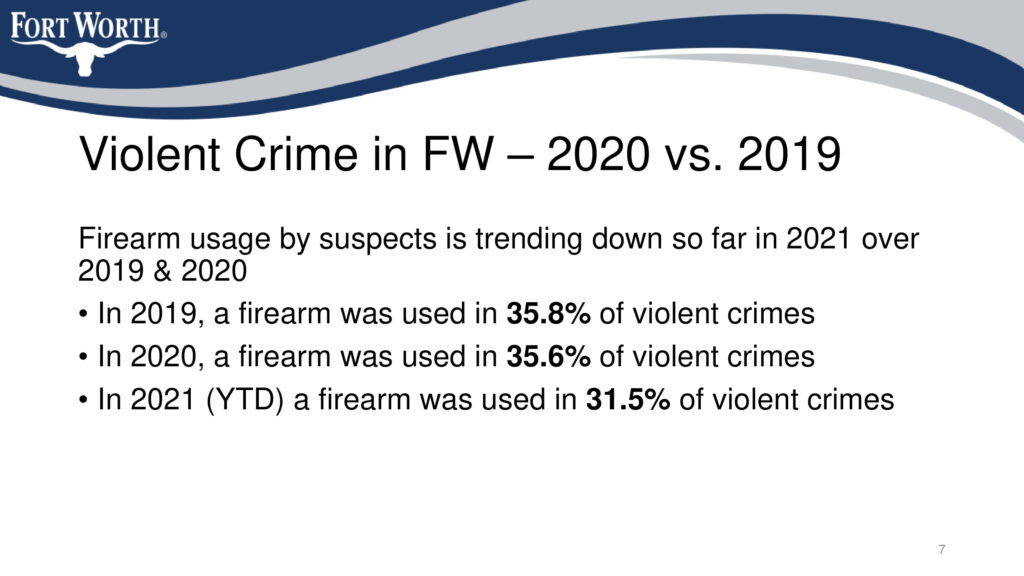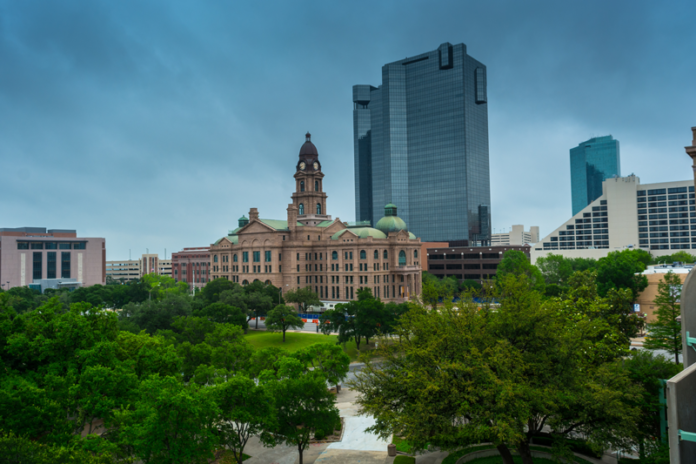Part 2 of a series on Crime in Fort Worth.
Noakes and City Manager David Cooke were interviewed by Business Press Editor Robert Francis and Associate Editor Paul K. Harral. What follows is lightly edited parts of that interview:
FWBP: Have there been changes in how you are doing policing on the street as a result of the pandemic and social unrest?
Noakes: One thing I’ve heard said before is ‘never waste a crisis.’ We did face a crisis when it came to COVID but I think one thing it forced us to do is to learn there are other ways we can get the job done when we have to. Look what we’re doing right here. Who would have thought 12, 13, 15 months ago that all of us would be here talking like this for an interview [on Zoom].
We found other ways to engage with the community because for me and the department, that community engagement and community inclusion component has got to be involved in everything we’re doing. If we can’t meet with people face to face the way we would really like to, we’re learning to find ways to do it like this.
Our police oversight monitor, Kim Neil, even helped during the summer to set up some virtual forums, community forums. What was great is not only do we have a large number of people in these forums, in one setting, during the forums we’d break out into breakout sessions. It’d be smaller groups where you actually got to interact in a more intimate environment to really talk about issues that were important to the public.
No question COVID has changed the way we do business, the important thing to know is we are continuing to do business.

FWBP: Has the Neighborhood Police Officer initiative been affected?
Noakes: It’s definitely harder but it’s not impossible. Even if it has to be smaller interactions, more frequently rather than meeting in large groups, we’re still finding ways to connect. We’re still finding ways to interact. When everything first started with COVID, and rightfully so, things were shut down, we didn’t know exactly what we had and we wanted to make sure we were protecting people. Safety’s got to come first.
We’re seeing now – especially with the vaccine that’s been rolled out, with people understanding the importance of PPE, the importance of washing your hands, social distancing – we’re finding we’re having more opportunities to engage a little more, a little bit at a time. We’re being safe and strategic about it, but we are finding ways to engage a little bit face to face while we still maintain that virtual component, we’re able to reach more people.
I won’t lie, it’s frustrating. I know recently we talked with some of our clergy and police alliance members, the CAPA (Clergy and Police Alliance) group, and they’d been very frustrated. Not necessarily with the department. … They wanted to get back in cars with officers, and be out there and help and be able to counsel people on calls, counsel our officers. But it just wasn’t safe having them in the cars.
We’re slowly looking at getting some things started back up where with proper PPE and proper safety protocols, we can get them back and engaged.
As the restrictions allow, as common sense dictates, the ability for us to move forward and do more based on what the medical professionals are telling us, we’re able to do more and more every day, we’re just making sure we’re smart about it.
FWBP: Is there a gang-related aspect to this?
Noakes: No, there are members of gangs that are involved in some of the crime, yes. But it’s not the overwhelming gang problem that we saw in the ’90s. Again, a lot of it goes back to some of the social media conflict, those conflicts may involve members of gangs, but we’re actually seeing sometimes members of the same gang, sometimes members of different gangs are aligning.
Before you had Cripps and Bloods. Very clear lines delineated, you had a structure of control and power within the gang. We see very disjointed collections of cliques, very small groups that’s very different than what we saw back then. It’s no less frustrating, but this is another example of how we’re having to pivot as an agency with the way we deal with it.
I’m not going to say we just have outrageous gang crime in Fort Worth, we don’t.
Some of the violent crime we’re seeing actually has to do with domestic violence. With people who know each other really well and who are often times family members. Unfortunately we’ve seen too much of that as well.
To say we’re being overrun with gang violence I don’t think is a fair characterization, but there is a gang component to some of the crime we’re seeing.
FWBP: How is the staffing level in the Gang Unit and similar units?
Noakes: We actually just got an effort out to increase level of that and some other specialized units. What we had done, we have been working with the city and they’ve been great helping us work with the staffing study that was done recently by a consulting group called Matrix. They kind of laid out the number of officers they felt we should have and how we can phase that in. Obviously COVID kind of threw a wrench in the works and it kind of threw off our plan a little bit, but our city leadership has been great about working with us and finding other ways.
We found some federal funding to help increase our numbers. Any time we can plus up our numbers we’re happy to hear that, because we were so low for a time in our patrol numbers, we froze our specialized units transfers.
Really, the heart of the department, the backbone of what goes on with Fort Worth PD, happens in patrol. Those are the officers that are out there answering the calls and citizens needing help, they’re the ones that are out there doing preventative patrol. Their job is to be in the community and keep the community safe. If we deplete patrol, nothing else we do really matters.
We did put a freeze for a while on some of our specialized unit transfers, but luckily because of the work we’ve been able to do with people like David Cooke, our city manager, we’ve been able to beef up our numbers in patrol considerably with some academy classes.
Because of that we recently posted some of those specialized units and gang is a very important one for us. Not just gang enforcement but the gang intervention and prevention unit. The ones who go out to the schools and go out to neighborhoods and try to talk to young people and make sure they never get involved in gangs in the first place. Maybe if they are involved in gangs they can help them find ways to get out and have alternatives.
We’ve been reevaluating some of our partnerships with various agencies. We’ve got some great partnerships with local, federal, county, state, but we’re making sure we focus on the ones that are providing the best service to the community. Ones that we cooperate with the best and get the best results on.






